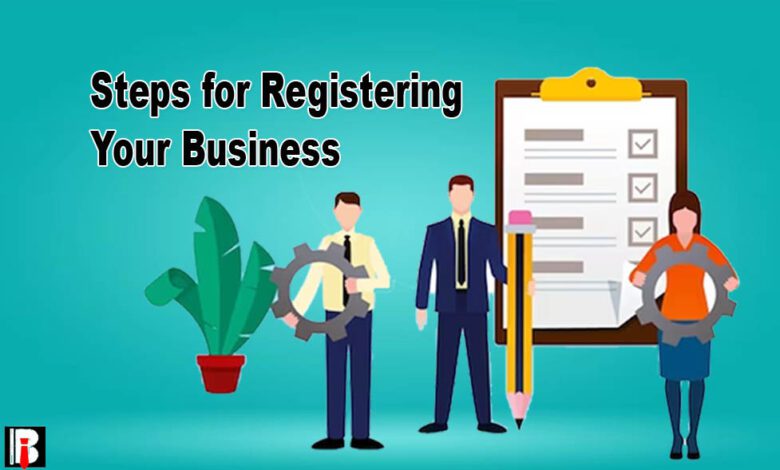Steps for Registering Your Business in Another State

Registering your business in another state is crucial to establishing a presence and unlocking growth opportunities. However, navigating the diverse requirements and processes can take time and effort. This guide outlines the essential steps to register your business in a different state smoothly. From researching state-specific regulations to completing the application and understanding ongoing compliance, we’ve got you covered. Prepare for a seamless expansion and confidently take your business to new heights.
Quick Shortcut Headlines
Steps for Registering Your Business:
Each state may have slightly different requirements and processes, but here are the general steps you can follow to register your business in another state:
Research State Requirements
Before registering your business in another state, thorough research is paramount. Begin by visiting the official website of the target state’s Secretary of State or relevant business registration agency. Delve into their specific requirements, processes, fees, and necessary documents for business registration. Familiarize yourself with naming rules, ensure your desired business name is available, and adhere to state guidelines. Many states require a registered agent with a physical address within their borders to receive official documents on behalf of the business. Download or request the required registration forms, and gather all necessary documentation, such as articles of incorporation/organization, certificates of good standing, and operating agreements.
Choose a Business Name
Selecting the perfect business name is a critical decision that can impact your brand identity and customer perception. Consider a name that reflects your company’s values, products, or services. Please keep it simple, memorable, and easy to spell and pronounce. Conduct thorough research to ensure the name is unique and not already in use by another business in your industry or location. Check domain name availability to secure a matching website address. Avoid names that might limit future expansion or create confusion. Test the name with potential customers and stakeholders to gather feedback. Ensure it aligns with your business’s overall vision and long-term goals.
Appoint a Registered Agent

Appointing a registered agent is an essential step when you’re in the process of registering your business in a different state. It could include tax notices, legal summons, or other government correspondence. It’s crucial that the registered agent has a physical address within the state and is available during regular business hours to handle these documents promptly. By selecting a trustworthy and reliable registered agent, you can ensure compliance with state regulations and that important communications are received and managed efficiently. Many businesses enlist professional registered agent services to guarantee the secure handling of sensitive information, allowing business owners to focus on their core operations and expansion.
Obtain Necessary Forms
To access the necessary forms for registering your business in another state, head to the official website of the state’s Secretary of State or the relevant business registration agency. You will find a dedicated section specifically for business registration or incorporation there. Look for a comprehensive list of forms and documents applicable to your business entity types, such as corporation, LLC, or partnerships. These forms typically encompass the application for registration, articles of incorporation/organization, certificates, and other pertinent paperwork. Depending on the state, you can download the forms directly through online submission, or you may need to request them via mail or in person from the appropriate agency.
Gather Required Documents
Compiling the required documents for registering your business in another state is a critical and essential step. First, prepare the articles of incorporation/organization or partnership agreement depending on your business structure. Also, obtain a good standing certificate from your home state to confirm your business’s legal status. Gather any relevant permits or licenses related to your industry or specific business activities if necessary. Pay attention to the completed application form, any supporting documentation requested by the state, and proof of payment for registration fees. By organizing these vital documents, you’ll be fully prepared to navigate the registration process smoothly and efficiently.
Complete the Application
Meticulous attention to detail is essential to complete the application for registering your business in another state. Begin by furnishing fundamental business information, including the name, address, and contact details. If relevant, enclose the certificate of good standing from your home state. Ensure you provide identification documents for all business owners or key personnel, like driver’s licenses or passports. If your industry mandates specific permits or licenses, include those as well. Before submission, thoroughly review all information for accuracy and completeness, and remember to include the required registration fees. A well-prepared and comprehensive application will expedite the registration process and increase the likelihood of approval.
File the Application
Initiating the application process to register your business in another state marks a crucial milestone in establishing your presence within that jurisdiction. Start by collecting all essential documents, including the completed application form, articles of incorporation/organization, partnership agreement (if applicable), and any supporting paperwork required.
Verify that all details are accurate and current. Depending on the state’s provisions, opt for online submission through the official website, adhering to the guidelines. Alternatively, if paper filing is mandatory, deliver the application and supporting documents by mail or in-person to the relevant state agency. Remember to include the necessary registration fees and comply meticulously with the state’s guidelines.
Wait for Approval
After submitting your business registration application in another state, the subsequent step involves patiently awaiting approval. The processing time for approval may vary based on the state’s workload and application volume, ranging from quick processing in some states to several weeks in others. During this waiting period, monitoring your application’s status is essential. Stay attentive to any communications from the state’s business registration agency and be ready to promptly respond to any additional information or documentation they may request. Your efforts will eventually pay off with persistence and diligence, and your business will soon operate legally and successfully in the new state.
Comply with Additional Requirements
Complying with additional requirements is vital to registering your business in another state. Apart from the standard registration process, certain states may have specific regulations and obligations based on your business type or industry. It may include obtaining industry-specific licenses or permits, adhering to zoning and environmental regulations, or fulfilling local tax requirements.
Thoroughly research the state’s laws and guidelines to identify any additional steps needed for compliance. Stay updated on ongoing compliance obligations to avoid any legal issues. By meeting these additional requirements, you’ll establish a strong legal foundation for your business in the new state and facilitate smooth operations within the region.
Update Business Information
Maintaining accurate records and compliance with the authorities is essential to keeping your business information up-to-date. Begin by identifying any changes that need to be made, such as a new address, updated contact details, or modifications in ownership. Ensure that your official documents, such as the incorporation/organization or partnership agreement articles, reflect these changes. Notify the state’s business registration agency of the updates using the appropriate channels, which may involve online forms or submitting documents by mail. Additionally, inform relevant licensing or regulatory agencies about the changes. Timely and precise updates help ensure that your business information remains current, reducing the risk of potential legal or operational complications.
Understand Ongoing Compliance Obligations
Understanding ongoing compliance obligations is essential for ensuring your business operates smoothly and remains in good standing with the authorities. Review the laws, regulations, and reporting requirements for your business type and industry. It may include filing annual reports, renewing licenses, and adhering to specific tax obligations.
Stay informed about any changes in regulations to avoid penalties and legal issues. Maintain accurate and up-to-date records and promptly respond to official requests or audits. Implement internal processes to monitor compliance and assign responsibility for meeting deadlines and requirements. Seeking professional advice or consulting with legal experts can provide valuable guidance in navigating complex compliance obligations.
Conclusion
In conclusion, registering your business in another state requires careful planning and adherence to state-specific requirements. Conduct thorough research on the target state’s regulations, gather the necessary documents, and appoint a registered agent if required. Completing the application accurately and paying the registration fees are crucial steps. After submission, patiently await approval while monitoring the application’s status. Complying with additional requirements and updating business information as needed will ensure ongoing compliance. Following these steps, you can successfully expand your business and seize new opportunities in a different state.




